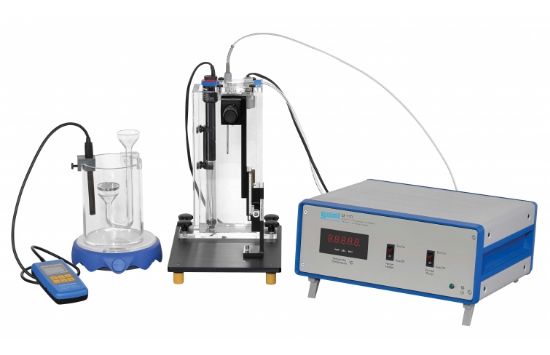Diffusion is the microscopic mass transport of particles such as atoms, molecules and ions due to differences in concentrations. It plays an important role in numerous processes. For example, diffusion can bring together the reactants in chemical reactions and, in some cases, it can be the rate-limiting step for the process.
CE 110 is equipped with two experimental units for investigating diffusion in liquids and gases. To investigate diffusion in liquids, a concentrated salt solution is used. The solution is contained in a U-tube, one end of which has a disc with several vertical capillaries. The U-tube is immersed into a tank containing demineralised water so that the disc with the capillaries is positioned below the surface of the water. The concentration gradient between water and the solution causes the salt ions to move out of the U-tube through the capillaries into the demineralised water. The capillaries ensure that the ions move in one dimension. A stirrer in the tank prevents the salt concentration increasing near to the disc, thus preventing concentration differences in the tank. A conductivity meter measures the salt concentration in the tank.
To investigate diffusion in gases, a highly volatile solvent is used. The solvent is contained in a vertical tube which is immersed into a heated water bath. The thermal energy from the water bath causes the solvent to evaporate. A fan generates an air flow, which moves horizontally at the upper end of the tube. The gaseous solvent diffuses due to the concentration gradient from the surface of the liquid solvent upwards to the pure air flow. The air flow transports the solvent molecules away, thus ensuring a constant concentration at the upper end of the tube. The volume of liquid solvent in the tube decreases over time. A scale microscope enables the level to be determined. A heater with controller keeps the temperature in the water bath constant.

